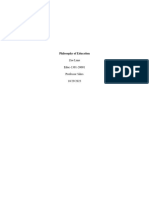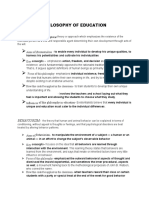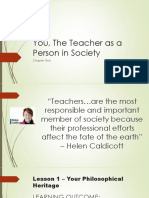Existentialism Notes
Existentialism Notes
Uploaded by
joan arreolaCopyright:
Available Formats
Existentialism Notes
Existentialism Notes
Uploaded by
joan arreolaOriginal Title
Copyright
Available Formats
Share this document
Did you find this document useful?
Is this content inappropriate?
Copyright:
Available Formats
Existentialism Notes
Existentialism Notes
Uploaded by
joan arreolaCopyright:
Available Formats
NOTES:
Existentialism –
Existentialism begins with the observation that humans are free beings who have
to make choices in life. For example, they must choose what values they will live
by and what they will do with their lives. But this freedom means that humans are
also responsible for their actions. They alone are accountable for what they do,
and no one else can take responsibility for them.
Existentialism can be applied to education because it emphasizes the importance
of personal experience and self-knowledge. For example, a teacher can use
existentialism to help students learn by encouraging them to explore their own
feelings and thoughts.
Existentialists -
Existentialists believe that we create our own values and find meaning in life by
making choices. The way we make these choices is through an act of will that
asserts our freedom in the face of what appears to be an external reality
(determinism) or even an internal reality (psychological determinism).
Role of Teacher –
The teacher in existentialist education is there to provide pathways for students to explore
their own values, meanings, and choices.
Since existence precedes essence, the existentialist teacher's role is to help students
define their own essence by uncovering them to various life paths and by fostering an
environment in which they freely choose their own preferred way. This is because
existence precedes essence, the existentialists' primary goal is to "help students
understand and appreciate themselves as unique individuals who accept complete
responsibility for their thoughts, feelings, and actions."
Take note: Existentialism suggests that human beings should have freedom to
make choices and then be responsible for the consequences of your choices.
You might also like
- ExistentialismDocument10 pagesExistentialismMarlou Maghanoy100% (1)
- Meaning of ExistentialismDocument9 pagesMeaning of Existentialismshilla bensonNo ratings yet
- EXISTENTIALISMDocument13 pagesEXISTENTIALISMKim LeeNo ratings yet
- ExistentialismDocument4 pagesExistentialismLydon SilaoNo ratings yet
- ExistentialismDocument3 pagesExistentialismArsalan kashif Kashif MaqsoodNo ratings yet
- EDUC 200 ExistentialismDocument16 pagesEDUC 200 ExistentialismTeacher FredielynNo ratings yet
- Alternative Philosophies EXISTENTIALISMCONSTRUCTIVISM BEHAVIORISMDocument51 pagesAlternative Philosophies EXISTENTIALISMCONSTRUCTIVISM BEHAVIORISMAileen Joyce EscasinasNo ratings yet
- ExistentialismDocument18 pagesExistentialismQaiser Abbas GhaffariNo ratings yet
- Existentialism As A PhilosophyDocument7 pagesExistentialism As A PhilosophyYnne KitduNo ratings yet
- Topic: The Nature & Scope of Essentialism, Perennialism and Existentialism Intended Learning OutcomeDocument4 pagesTopic: The Nature & Scope of Essentialism, Perennialism and Existentialism Intended Learning OutcomeKashmir FajardoNo ratings yet
- ExistentialismDocument9 pagesExistentialismche meaNo ratings yet
- Philosophy of EducationDocument7 pagesPhilosophy of Educationapi-696797501No ratings yet
- ExistentialismDocument23 pagesExistentialismFaisal JahangeerNo ratings yet
- Existentialism, Phenomenology and EducationDocument43 pagesExistentialism, Phenomenology and Educationrosminiaisyah0% (1)
- Existentialismmm PPTDocument9 pagesExistentialismmm PPTZARA MUSHTAQNo ratings yet
- Existentialism ReportDocument21 pagesExistentialism ReportMerben AlmioNo ratings yet
- Ailyn v. Carable - Other TaskDocument4 pagesAilyn v. Carable - Other TaskEricka Mae TizonNo ratings yet
- Handouts For ClassmatesDocument3 pagesHandouts For ClassmatesAyvie TiuNo ratings yet
- 2JEAN-PAUL SARTRE FinalDocument50 pages2JEAN-PAUL SARTRE FinalMaria TeresaNo ratings yet
- EXISTENSIALISMDocument4 pagesEXISTENSIALISMMercyNo ratings yet
- Chapter 8-Lesson 1 (, Junsay)Document24 pagesChapter 8-Lesson 1 (, Junsay)Jhane JunsayNo ratings yet
- Historical Survey of ExistentialismDocument5 pagesHistorical Survey of ExistentialismDaniela Marie SalienteNo ratings yet
- ExistentialismDocument16 pagesExistentialismMaribel membradoNo ratings yet
- ExperimentalismDocument44 pagesExperimentalismIlon Masiar100% (1)
- Philosophical Foundations of EducationDocument77 pagesPhilosophical Foundations of EducationChristian Christopher LopezNo ratings yet
- TPDocument2 pagesTPLiezel LebarnesNo ratings yet
- ExitbaDocument3 pagesExitbaSyd CabuhalNo ratings yet
- EXISTENTIALISM in EducationDocument40 pagesEXISTENTIALISM in EducationCritical ViewNo ratings yet
- The Impact of Social Media On The Academic Development of School Students The Impact of Social Media On The Academic Development of School StudentsDocument3 pagesThe Impact of Social Media On The Academic Development of School Students The Impact of Social Media On The Academic Development of School StudentsZurchiel LeihcNo ratings yet
- Existentialism TemplateDocument5 pagesExistentialism Templateevita eriveNo ratings yet
- Original Lines Paraphrased Lines Cite and URL: ExistentialismDocument6 pagesOriginal Lines Paraphrased Lines Cite and URL: ExistentialismmarjunampoNo ratings yet
- Script ReportDocument2 pagesScript ReportAndyjul AlagaoNo ratings yet
- Existentialism2017 171208045333Document33 pagesExistentialism2017 171208045333Maximo LaceNo ratings yet
- Educational PhilosophyDocument16 pagesEducational Philosophymicaellajoy.devillaNo ratings yet
- Draw Comparison Between Idealism and Realism in The Context of 21 Century Education System?Document4 pagesDraw Comparison Between Idealism and Realism in The Context of 21 Century Education System?sabahat shireenNo ratings yet
- CitationDocument3 pagesCitationGretchen Mae FacultadNo ratings yet
- Edjet Dela Fuerte - OutputDocument3 pagesEdjet Dela Fuerte - OutputEDJET DELA FUERTENo ratings yet
- Existentialism: Philosophy of EducationDocument20 pagesExistentialism: Philosophy of EducationMaryKtine SagucomNo ratings yet
- Lesson 11 Freedom of The Human Person Part 1 Hand OutsDocument16 pagesLesson 11 Freedom of The Human Person Part 1 Hand OutsNicole De la CruzNo ratings yet
- Lesson 5 Freedom of The Human PersonDocument16 pagesLesson 5 Freedom of The Human Personneldonomboy588No ratings yet
- ExistentailismDocument16 pagesExistentailismNizar Jan MhbNo ratings yet
- Critique PaperDocument5 pagesCritique PaperAnnie Jane Samar100% (1)
- ExistentialismDocument2 pagesExistentialismshintarojimenez89No ratings yet
- Freedom of The Human Person: Lesson 11Document16 pagesFreedom of The Human Person: Lesson 11Kyle Eco FostanesNo ratings yet
- Mphil NotesDocument17 pagesMphil NotesMuhammad Shahzad Mughal100% (1)
- Foundation of Education Report HandoutDocument6 pagesFoundation of Education Report HandoutLindsay Irish SorianoNo ratings yet
- Existentialism: Laurice S. BilonoacDocument1 pageExistentialism: Laurice S. Bilonoaccarine ghieNo ratings yet
- Existentialism D.mirasDocument22 pagesExistentialism D.mirasDanielle DupaNo ratings yet
- Unit IDocument5 pagesUnit IvinceresuelloghoulNo ratings yet
- Philosophies of EducationDocument28 pagesPhilosophies of EducationLennie DiazNo ratings yet
- FILSAFATDocument11 pagesFILSAFATdipsycacapoNo ratings yet
- SG 1 ReviewerDocument12 pagesSG 1 ReviewerJohn Paul AbalosNo ratings yet
- William James (Naila Mushtaq) PHD ScholarDocument26 pagesWilliam James (Naila Mushtaq) PHD Scholarnaila.mushtaq.eduNo ratings yet
- Existentialism: Philosophy of EducationDocument12 pagesExistentialism: Philosophy of EducationAlly RiveroNo ratings yet
- Philosophy Lesson 12Document28 pagesPhilosophy Lesson 12PJ John GilaNo ratings yet
- Unit 1 Philosophies in EducationDocument7 pagesUnit 1 Philosophies in EducationXerxes PhemenineNo ratings yet
- EXISTENTIALISMDocument12 pagesEXISTENTIALISMMeleza Joy SaturNo ratings yet
- Report - You As The Teacher in The SocietyDocument29 pagesReport - You As The Teacher in The SocietyMarly Joven100% (1)
- Be a Lion, Then B’eat Me!: Philosophizing Education to Earn Life; All Ages Matter!From EverandBe a Lion, Then B’eat Me!: Philosophizing Education to Earn Life; All Ages Matter!No ratings yet
- Curriculum Planning Curriculum Sources and InfluencesDocument1 pageCurriculum Planning Curriculum Sources and Influencesjoan arreolaNo ratings yet
- Psychological Foundations of CurriculumDocument4 pagesPsychological Foundations of Curriculumjoan arreolaNo ratings yet
- Activity Historical Foundations (US & Europe)Document4 pagesActivity Historical Foundations (US & Europe)joan arreolaNo ratings yet
- Curriculum Development ModelsDocument4 pagesCurriculum Development Modelsjoan arreolaNo ratings yet
- Curriculum DesignDocument3 pagesCurriculum Designjoan arreolaNo ratings yet
- 19TH Period NotesDocument4 pages19TH Period Notesjoan arreolaNo ratings yet
- Realism NotesDocument3 pagesRealism Notesjoan arreolaNo ratings yet
- S3 - Design PrinciplesDocument24 pagesS3 - Design Principlesjoan arreolaNo ratings yet
- Chapter 5Document31 pagesChapter 5joan arreolaNo ratings yet
- Past PerfectDocument1 pagePast Perfectjoan arreolaNo ratings yet
- Chapter 4 ParadigmDocument23 pagesChapter 4 Paradigmjoan arreolaNo ratings yet
- Adjective Prepositional PhraseDocument1 pageAdjective Prepositional Phrasejoan arreolaNo ratings yet







































































